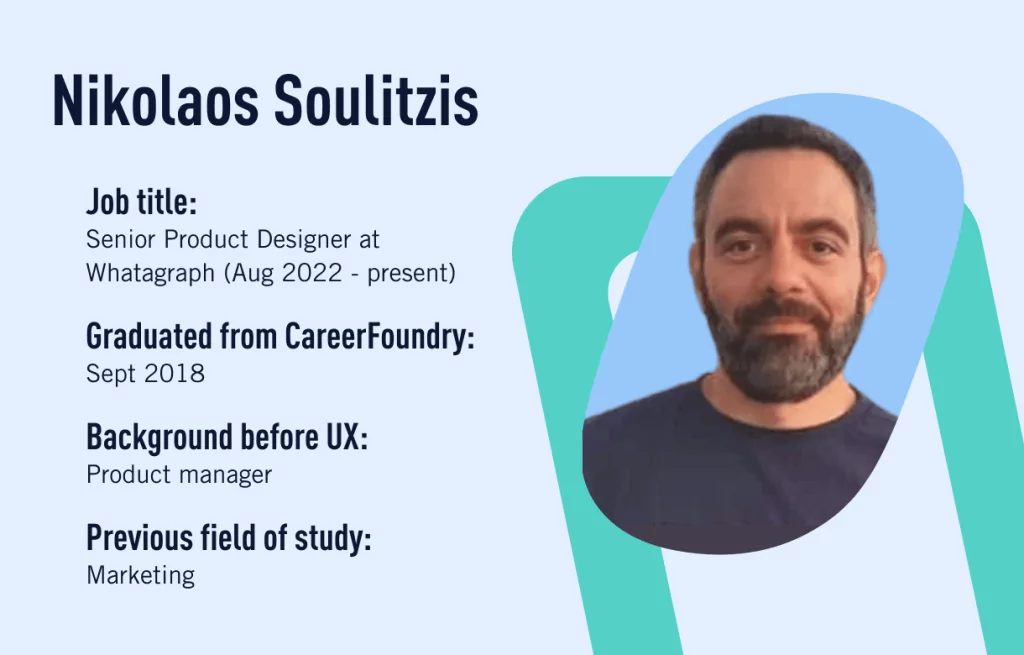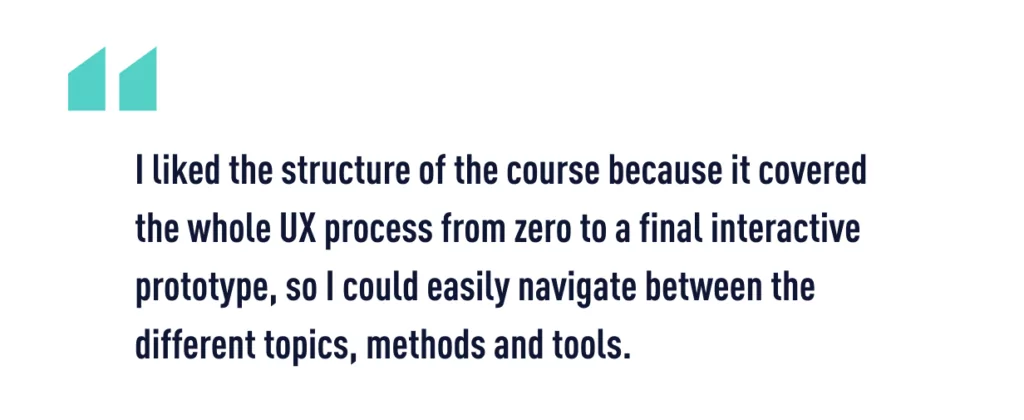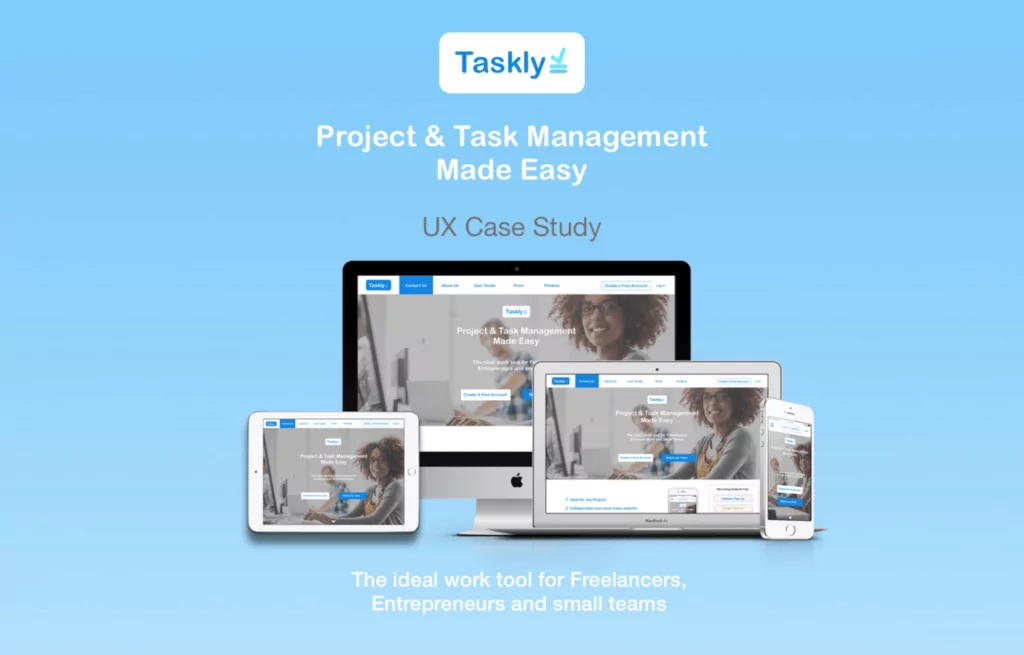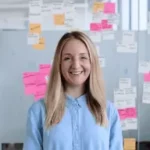
Product management and UX design roles have a lot in common. Both have good salaries, are healthy on the job market, and have a bright job outlook, but while a product manager works in more of a managerial style focusing on the execution of the product, a UX designer is more focused on the technical side of user experience.
There’s naturally lots of overlap, so if you’re a product manager thinking about your career progression, you might not have to think too far outside the box! In this article, we’ll find out all about Nikolaos’s product manager career progression journey to UX design.
Whilst working for a travel booking platform in London, Nikolaos discovered the secret to building successful products: great UX. The more he explored the different methodologies and tools, the more his fascination grew—until a career in UX seemed like the only logical next step:
“While I was working as a product manager, I realized the importance that UX plays in building successful products, and I was fascinated by the methodologies and tools used.”
One of the most interesting things about UX is that it draws upon such a variety of different disciplines—from marketing and business to psychology and, of course, design. Thankfully, coming from a marketing and product background, the move to UX felt natural for Nikolaos and he knew it was a viable career progression from product manager to UX designer.
However, he knew he had a steep learning curve ahead. Ad-hoc self-study wouldn’t suffice: instead, he sought a structured approach that would achieve maximum results in a short space of time.
As many adult learners do, Nikolaos soon found himself taking the online route. The CareerFoundry UX Design Program offered just the right amount of depth, covering both the theory and practical skills needed to navigate the tricky UX landscape:
“User experience is a complex area that includes various methodologies, approaches, and tools. I had some understanding of the basics from my product manager background, but I thought a bootcamp style course would help me improve my UX skills in a more organized manner and in a shorter time.”

While the quality of the curriculum certainly stood out, Nikolaos believes that the addition of an expert mentor took his learning to new heights. Although the program is completely online, each student is assigned a dedicated tutor and mentor—industry experts with plenty of experience in their fields. Throughout the course, tutors will mark task submissions and provide feedback, while mentors will check in via pre-booked calls, giving students the opportunity to discuss any concerns and seek valuable advice and one-to-one guidance:
“I think the most useful aspect of any course is to be able to have someone to guide you along the way. Having a mentor was the most useful and interesting part of the CareerFoundry course because he helped me improve my work and take my skills to another level.”
Invigorated by his new set of skills, Nikolaos dove head-first into the industry—not only polishing up his CV and portfolio, but also actively networking and seeking out fresh opportunities:
“After finishing the course with CareerFoundry, the first step was to redesign my CV, add new projects to my portfolio and ask for feedback from professionals I trusted. At the same time, I started to search for UX meetups, groups and events where I could meet other UX designers and network for job opportunities and collaborations. Then, after I received some initial feedback for my CV and portfolio, I started applying for UX roles and managed to do some freelancing projects.”

Nikolaos’s final project from CareerFoundry: a presentation for Taskly, a project management tool. To see more of his work, visit his portfolio website.
It goes without saying that Nikolaos’ proactive nature and enthusiasm for the field had a huge part to play in his success story. Together with his CareerFoundry certification, this proved to be the perfect recipe for his product manager career change journey:
“I think the structure and depth of the UX course acted as a good indicator of the level of UX skills I managed to acquire. Also, CareerFoundry is well recognized among UX professionals in the industry, even though it’s not a university.”
But did his enthusiasm continue once he actually started working as a UX designer? Was it a good career move for him switching from product management? Fortunately, his new career path didn’t disappoint and there were lots of ways he could build on his marketing and product background.
We asked Nikolaos what it was like to start his first job in UX, and his fervor for the field remains as tangible as ever:
“It was fascinating for me to work as a UX designer for two digital agencies, and to see how they apply UX methodologies and techniques to real high-scale projects. The best aspects of my new career are: being able to approach problems holistically and to innovate, collaborating with other designers, and having the freedom to experiment and solve problems creatively.”
To anyone considering a career change to UX design regardless of your previous experience, Nikolaos strongly recommends taking a free introductory course before making the leap:
“If you’re doing it for the right reasons, I would say go for it! That is, if you are passionate about it, and not making a career change just because of the money. I would suggest “testing” it first to see if you like and understand UX.
At present, you have the resources to explore and investigate any positions you are interested in. For example, you can take a free introductory course and talk with experienced UX designers. Then, you can decide if you want to invest the money and time to pursue a career change.”
If you want to take Nikolaos’ advice, you can give our free 6-day UX design short course a try. You can also book a call with an expert program advisor at CareerFoundry if you’d like some help figuring out your next steps about making a career change into tech.
If you’ve been inspired by Nikolaos’s product manager career change story, hopefully, you now know that making a switch to UX design is a rewarding career progression for product managers!
For more information about typical product manager career paths, check out this article: What Is the Typical Product Manager Career Path? Or if you’re curious to know if UX design is an ideal next step in your career progression, we can recommend this article: Is UX Design a Good Career for Me? The 2023 Guide
Update: Since speaking to Nikolaos for this article originally in 2018, he has indeed gone on to flourish as a UX designer! He’s gained some valuable experience in UX roles over the past few years, earned a promotion to senior UX designer status, and is now working as Senior Product Designer at Whatagraph, a marketing data platform. Congrats, Nikolaos!
